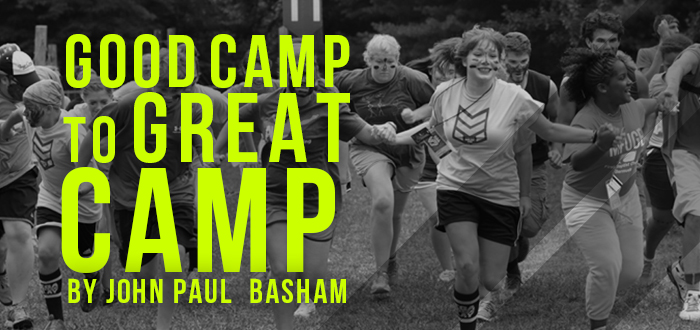We are right on the heels of Summer Camp this year!! Your summer camp is one of the biggest events that you will offer to your students all year, and done right, it can be one of the most fruitful events that you offer all year. Camp is one of just a few opportunities each year that you have your students’ attention for days at a time without the distractions of their everyday life. With this in mind, we have to take into account every detail of camp and make sure that we are milking every last drop of influence out of the time that we have. Here are 3 things to consider when trying to make the most of your camp…
1. Planning vs. Hoping
With probably just a few weeks left for students to register, it’s time to give that one last hard push for students to sign up for the best week of their lives! I remember the days of anxiety, watching registration numbers and praying that God would send more students. There is a point at which all you can do is pray that God sends students, but Student Pastors often fall short on doing all that they can in regards to promotion.
Secular sales wisdom says it often takes 7 touches to sell anyone a product or service. This is something that we can make great use of in our own promotional efforts. Send one last postcard, schedule one more phone tree, send your students who are registered on a mad dash to recruit their friends to come with them, and plan your next few services in such a way that your camp experience is promoted in 3 different ways during the service.
Here are two examples:
Option 1
- Make a video from camp footage last year to play at the beginning of the service.
- Play a game during the service that mirrors a game that will be played at camp and talk about how much fun it will be.
- Preach a message on the importance of taking advantage of evangelistic opportunities given to us to reach our friends, and point to what God can do through camp in the lives of their friends.
Option 2
- Play the camp promo video at the beginning of the service
- Preach the evangelistic message talking about how students can use camp to reach their friends
- Recruit 3 influential students to give testimony of how God worked in their lives through camp at the end of the service.
The key to all of these efforts is making registration easy and accessible. Make sure that you are set up to strike when the iron is hot and kids are motivated to sign up.
2. Strategy vs. Management
Whether you are running your own camp or attending one of our Fuge or Student Life Camps, you want to make sure that you are strategically planning each element of camp from top to bottom. Camp frustrations typically come due to situations that catch us off guard as a result of poor planning. This leaves you in a management mode which costs you a great deal of time and energy in an already taxing environment. The more detailed your planning, the less problems you leave yourself open to. The other great benefit of taking a strategic approach to your planning is that you give yourself a detailed baseline to use as a control for future improvements. By creating a systematic strategy, you will give yourself easy access points for evaluation that can drive your camp experience forward as you improve camp each year.
Some areas to consider are leader training for bible studies, group interactions, travel from one place to another at the camp, bus guidelines, dress code, specific leader roles at camp, rec time expectations, and leader meetings during camp. Obviously there are many other areas to consider and each area deserves equal time and attention to ensure a thorough treatment.
3. Environments vs. Activities
The last piece of advice I would give along these lines would be to think about each element of camp as an environment instead of an activity. With the typical 2 services and 2 Bible studies per day at camp, you have about 4 hours of influence each day which is fantastic! But just imagine if you trained and equipped your team to redeem times like recreation, meals, and travel time from place to place, effectively bumping up your influence to 6-8 hours each day. By training your volunteers on how to look for teachable moments, and encouraging them to keep the “conversation” going throughout the day, you could see incredible results in the lives of your students. Let the kids have fun at rec time, but use those games to illustrate something that you are learning in Bible study. Have fun at meal times, but ask a different student to pray over the meal for the group each time and challenge your students to serve one another by cleaning up each other’s trash at the end of the meal. Use every opportunity that you can to make and mold your students into disciples of Christ!
This post was written by John Paul Basham, Student Ministry Specialist



